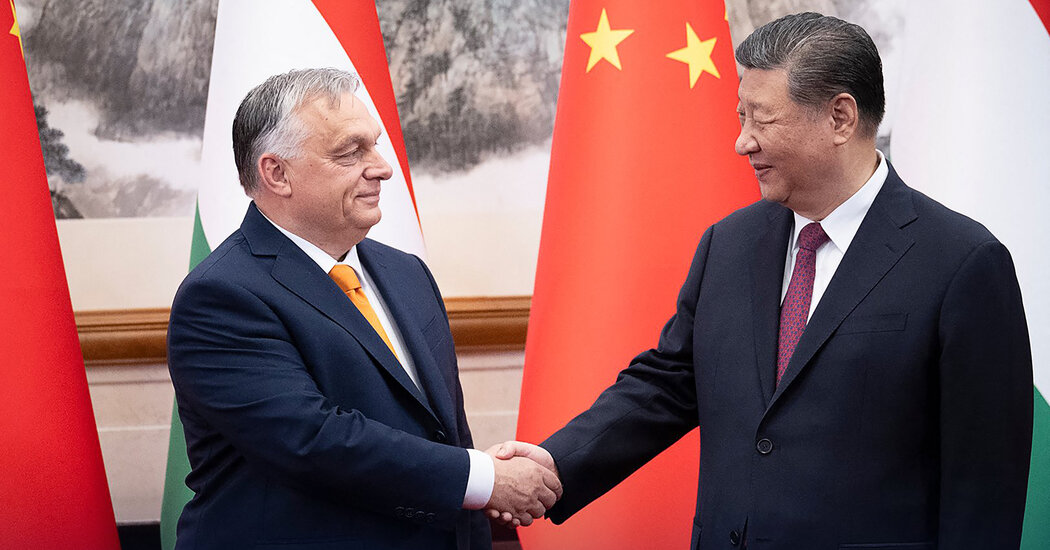Prime Minister Viktor Orban of Hungary met with China’s leader, Xi Jinping in Beijing on Monday, courting another authoritarian partner after talks with President Vladimir V. Putin of Russia in Moscow last week.
In announcing Mr. Orban’s visit to Beijing, China’s official Xinhua news agency said only that Mr. Xi would hold an “in-depth discussion with him on issues of mutual interest.” The leaders last met two months ago, when Mr. Xi visited Budapest as part of a drive to restore Chinese influence in Europe.
Chinese state television said that Mr. Xi and Mr. Orban were holding talks in the Diaooyutai State Guesthouse, but gave no other details.
This meeting will give Mr. Xi and Mr. Orban, an outlier in the European Union on support for Ukraine and other issues, a chance to urge the bloc to distance itself from Washington. Hungary began its six-month rotating presidency of the Council of the European Union this month, giving Mr. Orban a higher profile, though not much more influence, in wider European affairs.
“Our two countries of China and Hungary have similar philosophies and both esteem independence and acting on one’s own initiative,” Mr. Xi told Mr. Orban in May, according to an official Chinese summary of their talks.
Western European leaders have long distanced themselves from Mr. Orban, and when he visited Moscow last week, they emphasized that he did not speak for the European Union. They are likely to take a similarly skeptical view of Mr. Orban’s talks with Mr. Xi in Beijing, during which the two leaders are expected to discuss the war in Ukraine.
Mr. Orban’s visit to China comes before a three-day NATO summit in Washington that starts on Tuesday. At those talks, President Biden and other Western leaders are likely to offer Ukraine more support in its war against Russian invasion, though not the NATO membership that its president, Volodymyr Zelensky, has urged.
Mr. Orban described his trip to Beijing as continuing a mission for “peace” for Ukraine, a term Hungary has used to describe a settlement built on Ukrainian capitulation to Russian demands. His visit to Russia last week was the first time a European Union leader had gone there for official talks with Mr. Putin since the first months of Russia’s invasion of Ukraine.
Before visiting Moscow, Mr. Orban met in Kyiv with Mr. Zelensky, which observers saw as a move by the Hungarian leader to try to end his isolation in Europe over Ukraine. His visits to Ukraine, Russia and China were not announced in advance.
Mr. Orban has issued broad calls for Moscow and Kyiv to agree to a cease-fire and direct talks, but he has not issued any specific public proposals for a lasting settlement.
Similarly, Mr. Xi has promoted a vague framework for peace negotiations between Ukraine and Russia, while remaining careful to maintain strong ties with Mr. Putin. Chinese troops will take part in military exercises in Belarus, a neighbor and close partner of Russia, in mid-July, China’s Ministry of National Defense announced on Sunday. The ministry said the joint drills would focus on “counterterrorist” operations and rescuing hostages.
The talks between Mr. Orban and Mr. Xi will give them another opportunity to underscore their shared antipathy to Western security alliances and human rights criticisms.
Mr. Orban, once a critic of China’s ruling Communist Party, has become a firm partner. He often opposes the European Union’s criticism of China’s hard-line policies in Hong Kong, Tibet and Xinjiang, the western region where Uyghurs and other largely Muslim ethnic groups have endured mass detention.
In May, Mr. Xi and Mr. Orban officially elevated China-Hungary relations to an “all-weather comprehensive strategic partnership” — Chinese diplomatic terminology that suggests a deep and enduring bond.
“We see each other as a priority partner of cooperation,” Mr. Xi wrote back then of relations with Hungary.





